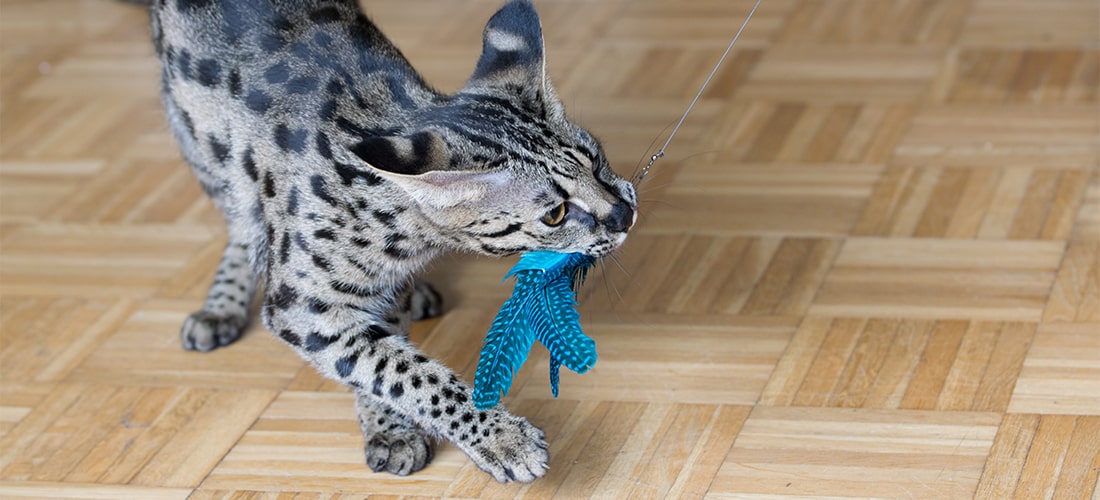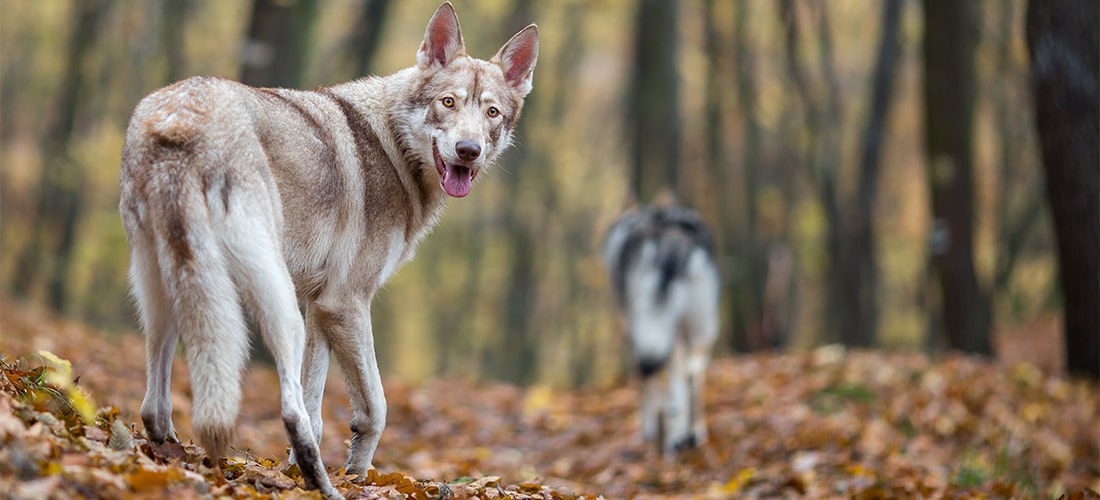When we say ‘hybrid breeds’, you might think of mixed breeds such as Cockapoos or Labradoodles, but we’re talking about exotic hybrids, where a wild species is mixed with a domestic one, like Wolfdogs or Savannah cats.
Wild hybrids may appeal to a lot of people as they look a certain way, but they’re very expensive and unprepared owners may find they’ve bitten off more than they can chew! Our vets don’t recommend owning a wild hybrid as they come with complex additional needs compared to a normal domestic pet that we as owners simply cannot meet.
What are exotic hybrids?
Exotic hybrid breeds are the breeds created when a domestic pet is bred with a closely-related wild animal species. This means that an exotic hybrid has a direct genetic link to a wild animal and usually doesn’t behave quite like a normal pet. Where this has been done, you will often see them called ‘F1’s, meaning they have a ‘wild’ parent and are ‘first generation’. The higher the ‘F’ number, the further back the wild ancestor was, so the more diluted the wild genetics are.
Exotic hybrid breeds tend to be much larger than domestic pets and they look a lot more like their wild parents (which is one reason why people like them so much). However, they come with a lot of extra responsibility as they have complicated welfare needs compared to domestic pets and even several generations removed can be very different from a normal pet of that type.
Because of their wild parent, these hybrid breeds won’t have the same temperament as a domestic cat or dog. They’re likely to have much stronger hunting instincts and don’t always settle well into family life. They often need to spend much more time outside being active (which isn’t always possible for owners).
If you’re thinking of getting a wild hybrid, you’ll need to thoroughly research their needs and seriously consider whether you can accommodate them or whether you would be better off with a domestic pet. You may find that you have to make costly changes to your house to accommodate a wild hybrid and make changes to your lifestyle. There is also the question of whether keeping a part-wild animal as a pet is the right thing to do, as they are less used to living among humans and may be much less comfortable in a home environment than a normal pet.
Hybrid cats

There are a few breeds of exotic hybrid cats you may see available in the UK. These are:
- Bengal (F1 domestic cat x Asian Leopard cat, although most available now are many generations from a wild ancestor)
- Chausie (F1 domestic cat x Jungle Cat)
- Savannah (F1 domestic cat x Serval).
These animals don’t make great pets due to their complex needs. Though Bengals are fairly common and therefore less likely to be close to a ‘true F1’ (i.e. they have a wild parent), they still require a lot more care and attention to meet their needs than normal pet cats. Our vets recommend adopting a regular moggy as they are much easier to accommodate and make really great family pets.
Hybrid cats usually have very strong hunting instincts and will need even more time to play and be active. They aren’t lap cats, so if you’re looking for a cat that will come and have a cuddle then these really aren’t the breeds for you. They can also be stubborn and difficult and while some owners may say their hybrid is friendly, it is always hard to predict their temperament.
All of the above breeds are usually larger than your typical domestic moggy. Due to their size, especially with Chausies and Savannahs, they will not be able to roam free like most domestic cats. Savannahs can jump great heights and all of these cats are great climbers and expert hunters due to their wild genes. This is why owners keep them contained – their size could mean they start to prey on animals much bigger than the mice or birds that other domestic cats like to hunt.
Being kept inside can be a problem for the cats themselves, as all these breeds, including Bengals, need a lot of exercise to keep them happy and healthy. Owners of these cats must go the extra mile to make sure that their cats are getting several hours of exercise a day. Owners also need to provide plenty of mental stimulation to replace the natural excitement and fun they would get from hunting or exploring, over and above the playtime a normal domestic cat would expect.
These exotic hybrids not only need a large, purpose-built outdoor run and may benefit from harness training to get them out and about safely, but also need more attention and thought as to how to fulfil their natural instincts – all of which are a time, money and energy investment for their owners.
Wolfdogs

Wolfdogs are exactly how they sound – a domestic breed of dog, bred with a wolf. There are currently two breeds of Wolfdog in the UK:
- Saarloos Wolfdog
- Czechoslovakian Wolfdog.
Wolfdogs have been growing in popularity in recent years and many people might like the idea of owning one but do not know what they are getting into. Wolfdogs are usually created by breeding a wolf with a German Shepherd, Husky or similar breed of domestic dog. But owning a Wolfdog isn’t like owning a Husky or German Shepherd. They are much more challenging animals that aren’t really meant to be pets. They need a lot of space and should never be left on their own. They are large dogs and often need very experienced handlers, who have worked not only with dogs but also with wolves to understand their needs.
Wolfdogs need a lot of space to run and be able to fulfil all their wild behaviours – they need much more exercise and attention than a domestic dog. They can be difficult to train and crave the company of a “pack”, so are not a breed to be left home alone. Like their wild ancestors, you can expect Wolfdogs to be very vocal.
They don’t make good family pets because they need a lot of training and an experienced handler who can focus all their attention on the dog. Although they have been bred with domestic dogs, their personalities can often be more like a wolf’s.
The body language of wolves can be quite different to that of domestic dogs and they don’t react to people in the same ways. Wolfdogs are less inclined to think of humans as friendly or to try to please them compared to normal dogs, so without an experienced handler there is a real risk of aggression or injury as well.
Our vets recommend adopting a domestic breed of dog instead of a wolfdog. While they may look striking, they don’t make good pets. Instead of picking a dog for its looks, choose a breed based on its personality and health to ensure you will have a healthy, happy pet who will enjoy your company as much as you enjoy theirs and will be suitable for your lifestyle. Check out our Get PetWise Quiz if you want to find out which pet is best suited to you.
Is it legal to keep an exotic hybrid?
The closer the hybrid is to its wild bloodline, the more likely it is to be classed as an exotic or wild animal and require special licensing to own. Therefore, most of these hybrids available to the general public should have heavily diluted wild bloodlines.
In the UK, F1 generation Wolfdogs where one parent is a wolf are subject to the Dangerous Wild Animals Act 1976 and require a licence to own. It is legal to own a Wolfdog as long as they are three generations (F3) away from the original parent wolf. If you are in any doubt, contact your local authority to find out whether a breed will require a licence.
As with F1 Wolfdogs, F1 Bengals, Savannahs and Chausies will also require a licence under the Dangerous Wild Animals Act 1976. You should not be able to purchase these on the open market. F2 generation or later are legal to own, but again we wouldn’t recommend it due to the restrictions you’ll need to put in place to keep these animals in a domestic environment, which can be frustrating and make them stressed, as well as the extremely high commitment that these animals represent.
Our vets’ advice
Our vets recommend considering a normal domestic cat or dog before looking to purchase a wild hybrid as they are more likely to suit your current lifestyle and home.
Due to their direct wild ancestry, our vets would never recommend these breeds as family pets. They will need a lot of extra time and training and are unlikely to settle into normal family life very well. They may be more aggressive than domestic pets and so unsafe around children and other family members.
Whether you do choose to get an exotic hybrid is ultimately up to you, but our vets recommend thoroughly researching the breed and their requirements before making any decisions. They are often much more difficult to properly look after than domestic pets and some owners struggle if they aren’t fully clued up on what to expect.
Rather than choosing a pet with a certain look about it, why not check one of the many rescue centres across the country that have beautiful pets looking for homes.
Get PetWise
Find the best pet to suit your home and lifestyle with our Get PetWise Quiz! Find your ideal pet.
Take the quizGetting a dog
Everything you need to consider when you're looking to get a new dog - including where to get one from!
More infoGetting a cat
Our vets give their advice on what to consider when getting a new cat and where you can find the perfect pal.
Read more
